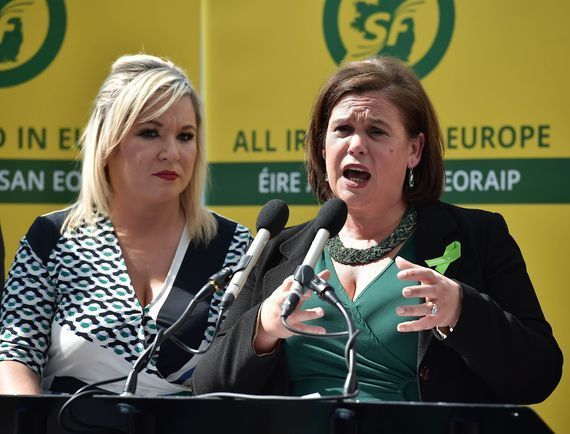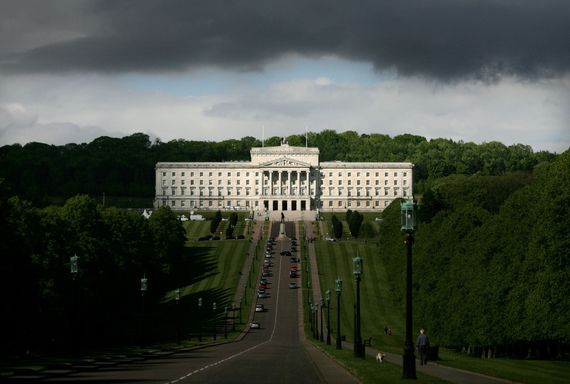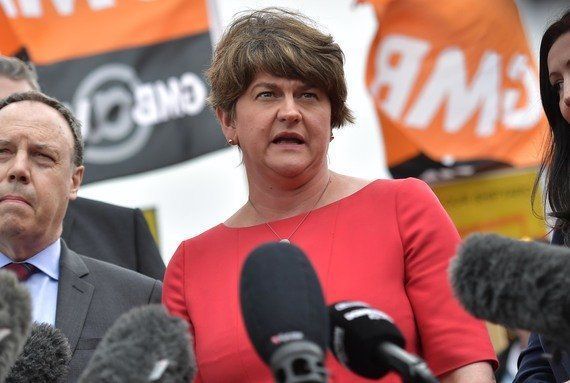Three years after the collapse of the power-sharing government in Northern Ireland, the Stormont parliament finally got back in business last week.
The British and Irish governments had come up with a lengthy agreement deal that both sides accepted, although it was a grudging, half-hearted acceptance rather than an enthusiastic one.
Still, at least it meant that Northern Ireland will now have its devolved government up and running again. After endless hours of talks with the parties and three years of accusations and bitterness between them, the two governments had finally managed to get both sides to agree to resume the power-sharing Stormont administration.
Ulster had said yes -- although listening to the interviews with Democratic Unionist Party (DUP) leader Arlene Foster and Sinn Fein leader Mary Lou McDonald after the breakthrough, it was clear that this was a reluctant and uncertain yes.

Sinn Fein leader Mary Lou McDonald.
Despite their lack of enthusiasm, however, both sides claimed that they had got what they wanted. Or at least enough of what they wanted to be able to work together in government again. The truth is that both sides have had to swallow stuff that makes them queasy.
The deal has no stand-alone Irish Language Act, for example, which had been a key Sinn Fein demand in their battle for parity of esteem between the two identities in the North. Instead, the status of Irish is part of a complex arrangement which includes Ulster-Scots.
And there is no provision for bilingual Irish/English road signs. On the other hand, nationalists will now have the right to use Irish in Stormont, and there will be translation facilities for the loyalists who don't have the cupla focail. There will also be a right to use Irish in many interactions with the state.
Read more: Same-sex marriage is finally legal in Northern Ireland
None of this will sit easily with many unionists who see it as the thin end of a wedge designed to undermine the Britishness of the North. Apart from the sensitive language issue, there were other areas where the two sides had disagreed so much it meant they were unable to work together for the past three years.
The deal they have now accepted as the basis for reviving Stormont does not solve all these issues. Instead, it buries them under a mound of verbiage that may or may not work. We'll see in the coming months.
So do Arlene and Mary Lou deserve our gratitude for courageously taking a step forward despite their misgivings? Well, no. Courage has nothing to do with it.
The truth is they had both run out of road.
The public in the North are tired of their intransigence and the dire effect on public services caused by the lack of a government in Stormont. This was particularly evident in health, with nurses in the North on strike last week. The place was being run by civil servants who were doing as little as possible, nothing was changing and people were fed up.
Meanwhile, the North's politicians were still getting paid even though Stormont was not functioning, something that angered everyone.
After three years, the people had had enough, which is why both the DUP and Sinn Fein lost a significant amount of support in the last election. The non-partisan Alliance Party made a comeback, as did the SDLP, the old nationalist party that Sinn Fein had cannibalized.
Failure to get Stormont working again was also going to mean the northern secretary calling an immediate election in the North, which could have meant the DUP and Sinn Fein both losing more ground. So the writing was on the wall and both Arlene and Mary Lou knew it was time to compromise. And as usual in the North, there was a big bribe involved, courtesy of the long-suffering British taxpayer.
The northern secretary made it clear that the hundreds of millions of extra spending promised with the deal would only happen if Stormont was revived. The Irish government has promised over €100 million in investment to be funded by taxpayers in the south and that was also on the line.

Stomont Estate, where the Northern Ireland parliament sits.
In addition to all this, there was another compelling reason for Sinn Fein to give in at this point. We are about to have a general election in the south and Sinn Fein did not want to be seen by voters here as the party that was holding up progress in the North. On the DUP side, their influence in Westminster was gone since Boris Johnson's election victory and they needed to be more accommodating.
So for all these reasons, mirabile dictu, suddenly Stormont was back again. What was really nauseating about last week's breakthrough was the self-congratulatory poses being adopted by both Foster and McDonald. The truth is that when you dig down through all the verbiage, finessing and fudging in the deal, not that much has changed.
They could have resurrected Stormont long ago on this basis. Instead, shamefully and for their own party reasons, it suited them to leave it locked up.
They have now opened it up again only because at this point it benefits them, not because there has been any great "breakthrough" in parity of esteem, respect, and acceptance between them. What all this reveals is the huge gap that still has to be bridged in the North before there can be any hope of a new Ireland, one in which all traditions are fully respected and historical grievances are recognized but put aside. It shows how little would be achieved by a border poll, whatever the outcome.
The first task has to be the building of complete acceptance, trust and friendship between the two traditions in the North. The difficulty in getting Stormont back again has shown how far we have to go on that. Any moves towards a united Ireland before that is achieved risks the return of conflict and bloodshed. None of this is easy, and not just in the North.
The hostile reaction here to the government's proposal to have a commemoration for the Royal Irish Constabulary (RIC) has shown how sensitive our historical legacy can be in the south as well.
The RIC event (now canceled) was to be a very small part of our ongoing centenary commemorations of the events that led to the formation of the state -- the 1916 Rising, the War of Independence and so on. One can argue that commemorating people like the RIC who were part of the British administration in Ireland in the pre-independence period is inappropriate or even wrong.
But that shows a lack of awareness of what Ireland was like at the time -- a peaceful, relatively successful country in which the vast majority of people were getting on with their lives and respected their local police.
That remained true even as interest in Irish culture and support for Home Rule grew, and when the Rising happened most of the population regarded those involved as a small group of deluded fanatics.
Of course, all that changed after the executions. Public opinion moved swiftly and as the IRA fought the war of independence the RIC were caught on the wrong side of history.
Most of them were Catholics from rural areas, decent men just trying to do ordinary police work. They were easy targets for the IRA and as the fight for independence went on hundreds of them were slaughtered.
The history of the RIC at the time is complicated by the British bringing in the Black and Tans to prevent the police collapsing in the onslaught. Brutal things were done by the Tans and to a lesser extent by the RIC, but also by the IRA.
Read more: Waking up on the wrong side of history with the Black and Tans “controversy”
So do we write the RIC men out of our history? Was the government right to remember them in a small way as we go through our centenary commemorations of the period? Are the thousands of their descendants today not entitled to some kind of acceptance, recognition, and closure?

Black and Tans.
Yes, we recognize now that they were on the wrong side of history. But 100 years later we should be able to accept that our history is complex and that even those who were on the wrong side may have believed they were doing the right thing at the time. We have grown up a lot in recent times.
We can now celebrate the Irish who fought with the British in the First World War at the same time as the 1916 Rising was going on at home.
The Queen laid a wreath in memory of those who died in the fight for Irish freedom when she was here in 2011.
And we were grown up enough to welcome her here in spite of our difficult history, including our more recent history. With all that in mind one might have thought we were mature enough as a nation to cope with a minor remembrance of the RIC. So the vitriolic furor the proposal caused last week was somewhat surprising and disappointing, not least because we have even more difficult events ahead.
Paying homage to 1916 was the easy bit. Our so-called Decade of Centenaries will also include remembering the War of Independence, the truce, the Civil War and partition.
It's a bloody and complicated period and neither the heroes or villains are always on one side. Trying to airbrush the RIC out of our history is not a good start. And as Taoiseach Leo Varadkar pointed out, it does nothing to reassure unionists in a way that could make a united Ireland possible any time soon.
Read more: High-speed rail tunnels could connect Ireland to United Kingdom




Comments